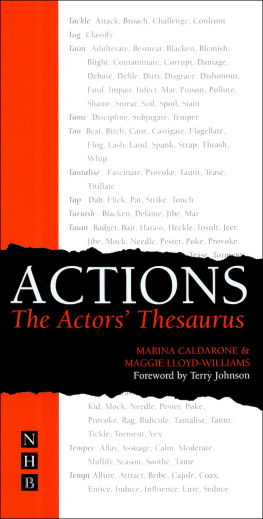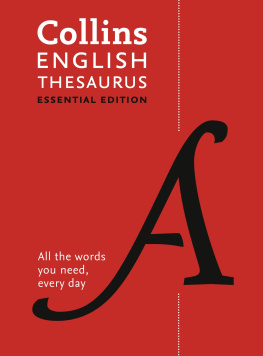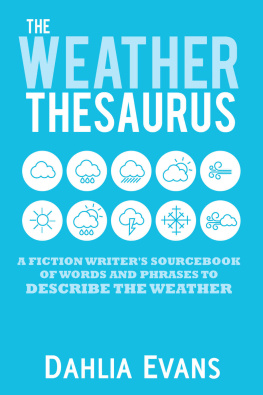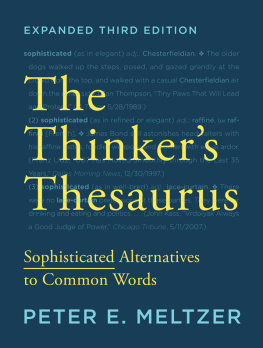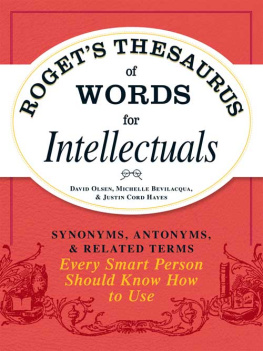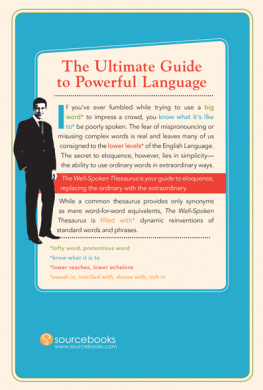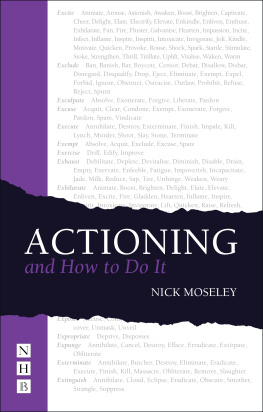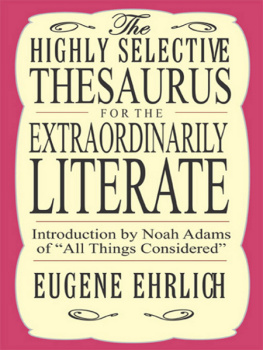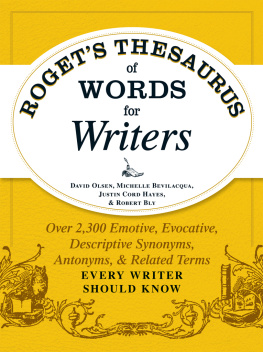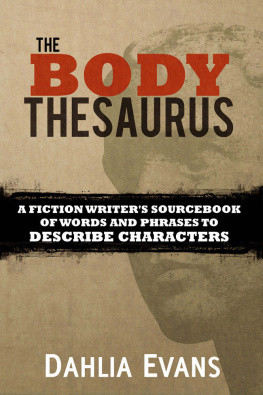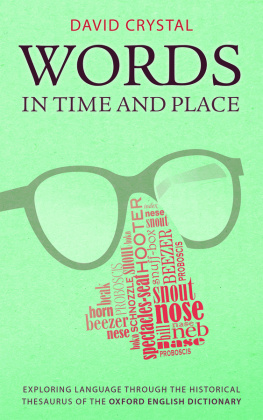Caldarone Marina - Actions: the actors thesaurus
Here you can read online Caldarone Marina - Actions: the actors thesaurus full text of the book (entire story) in english for free. Download pdf and epub, get meaning, cover and reviews about this ebook. City: London, year: 2017, publisher: Nick Hern Books, genre: Detective and thriller. Description of the work, (preface) as well as reviews are available. Best literature library LitArk.com created for fans of good reading and offers a wide selection of genres:
Romance novel
Science fiction
Adventure
Detective
Science
History
Home and family
Prose
Art
Politics
Computer
Non-fiction
Religion
Business
Children
Humor
Choose a favorite category and find really read worthwhile books. Enjoy immersion in the world of imagination, feel the emotions of the characters or learn something new for yourself, make an fascinating discovery.
- Book:Actions: the actors thesaurus
- Author:
- Publisher:Nick Hern Books
- Genre:
- Year:2017
- City:London
- Rating:3 / 5
- Favourites:Add to favourites
- Your mark:
- 60
- 1
- 2
- 3
- 4
- 5
Actions: the actors thesaurus: summary, description and annotation
We offer to read an annotation, description, summary or preface (depends on what the author of the book "Actions: the actors thesaurus" wrote himself). If you haven't found the necessary information about the book — write in the comments, we will try to find it.
Actions: the actors thesaurus — read online for free the complete book (whole text) full work
Below is the text of the book, divided by pages. System saving the place of the last page read, allows you to conveniently read the book "Actions: the actors thesaurus" online for free, without having to search again every time where you left off. Put a bookmark, and you can go to the page where you finished reading at any time.
Font size:
Interval:
Bookmark:

ACTIONS
The Actors
Thesaurus
MARINA CALDARONE
and
MAGGIE LLOYD-WILLIAMS

NICK HERN BOOKS
London
www.nickhernbooks.co.uk
To
Lucy McNulty
and
Elaine Roundacre
CONTENTS
by Terry Johnson
Thanks
The authors would like to thank Susan Angel, Kellie Bright, Emma Burnell, Lisa Carter, Beth Cordingly, Oliver Cotton, Kevin Francis, Jon Garside, Peter Guinness, Clifford Milner, Neil Pearson, Adrian Reed, Mark Scollan, Wanjiku and Murray Shelmerdine, Max Stafford-Clark, James Wilson, Julian Woolford and all their friends and family for their support and patience.
FOREWORD
I once met Sinead Cusack at a Christmas party. The previous year shed been offered a job by Max Stafford-Clark. Shed heard about the way he works. (Max requires his actors to action each line of text and to annotate their scripts, sitting around a table for two to three weeks of rehearsal to achieve this.)
Sinead had told him, Id love to work with you, but I know how you work and I have to say upfront I cant do it and I wont do it.
Max replied, Try it for a week.
No.
I really want you to play this part. Give me four days.
No.
Three days.
Absolutely not.
Give me two days and if youre not happy, well do it your way.
A big gesture from the immaculate Max. So finally, consigning the first two days of rehearsal to what she imagined would be a complete waste of her time, Sinead agreed to do the job.
She told me, I did it his way for two days, then three days, then a week. Two weeks later we were still at it. She took a sip of mulled wine, tasting the memory, then in her gorgeous liquid brogue said, How did I ever act before that?
I have worked with actors whose foreheads hit the table at the very mention of an action. I have worked with actors who energetically resist the idea that rational thought might be part of their creative process. But I have helped transform some young actors by converting them to a belief in Actioning. More instructively, I have worked with many actors (and I include in this all the best ones) for whom actions are a second language. Not a foreign language or an exotic one, but a technical articulation of the elusively human. A good actor talks about actions like a builder-decorator talks about the nature of nails or the colour of paint. Actions can lead an actor from confusion to clarity, from muddle to magnificence, from the clichd to the complex.
This thesaurus of riches can help the actor develop that language. The final section is a genuine tool, using which the actor can analyse any one moment of his characters journey, define instinctively the basic polarities of feeling towards another character, then select the intensity of that feeling, and thus arrive at a choice selection of appropriate transitive verbs.
It sounds complex, but so is dancing the salsa, and that only takes an hour or so to get into the musculature. If you want to act, or act better, actions will take you a long way on the journey to excellence.
TERRY JOHNSON
INTRODUCTION
Actions The Actors Thesaurus aims to clarify a widely used rehearsal and performance technique, known by different names, but here called Actioning.
Actioning provides the stimulation for the actor to directly play each line of the text and develop alternative ways of bringing their character to life. The technique encourages performances with accurate and dramatic communication between characters.
Actioning heightens the actors spontaneity, discouraging him or her from monotonously and automatically replicating a tone. Everyone has seen productions particularly of Shakespeares plays where, if they were completely honest, both audience and players alike dont have a clue about whats going on; its all sound and fury signifying nothing. Actioning should keep the actors in the moment and deter what Peter Brook calls deadly acting, where nothing is going on, just words being spoken.
If the actor plays a real and specific action on each sentence then, even though the audience are unlikely to be able to identify the technique or the individual action, the work will be interesting and absolutely watchable because of its precision. Actioning enforces a specificity which can liberate the actors performance and ensure a cohesive integrated character with each moment leading naturally onto the next.
Actioning is a starting point for use in the rehearsal room and for private textual analysis. It really comes to fruition in performance, affording actors the self-confidence to develop and refine their choices continuously. Actioning keeps the text alive by ensuring the drama is active and subject to constant redefinition.
If a whole company takes an hour to explore the principle at the start of rehearsals, a shared dramaturgical language is established. This synchronisation can save rehearsal time and facilitate more efficient communication.
Stimulation Spontaneity Specificity Self-confidence Synchronisation
Actioning is primarily for actors for established professionals and beginners alike, for students or amateur actors, for those with training and those without. Actioning can also be useful for music theatre performers, for actors wrestling with audition speeches, for those who have to breathe life into a one-dimensional television or radio commercial, or for those who have been performing a play for months and need to reinvigorate their performance.
This book can also be used by academic students of drama to deconstruct a script for its sub-textual dynamic.
The Origins of Actioning
Actioning comes from Stanislavski (1863-1938), the Russian actor/director/theorist who formulated a revolutionary acting methodology which seeks to enhance psychological depth and emotional truth in performance. His system, still studied and practised widely around the world, acted as a catalyst for other approaches to acting, including the American Method.
In his work (primarily at the Moscow Art Theatre), Stanislavski pioneered a series of exercises and rules which would allow actors toaccess their emotions more freely and maintain the essential but elusive creative state.
Concentrating on Actioning may be many actors way of short-circuiting all elements of the rather more complex and more psychologically demanding system. Nonetheless, knowledge of key elements of Stanislavskis system is vital before being able to begin your work on Actioning.
Units and Objectives
Finding an action for a particular moment or line of text is dependent upon understanding the Stanislavskian concept of units and objectives (sometimes called episodes and tasks). In each unit of the text, you must decide on your objective (what your character wants) before defining the action (how your character sets out to get it).
Begin by breaking the scene up into units, each containing a single defined objective. Stanislavski makes a useful analogy in An Actor Prepares. For him, the process of dividing a play into its component units is like breaking up a cooked chicken so that it can be eaten. If eaten portion by portion, then the whole chicken can ultimately be devoured. Similarly, the scene is broken into its separate portions or units in order to be investigated. Each unit has its own title, which describes what that unit is about, and each character has his or her own objective at the heart of that unit. Like units, which can be major (whole sections of text) or minor (a single word or short sentence), so the characters objectives are major or minor according to how the second-to-second minutiae of the scene develops.
Font size:
Interval:
Bookmark:
Similar books «Actions: the actors thesaurus»
Look at similar books to Actions: the actors thesaurus. We have selected literature similar in name and meaning in the hope of providing readers with more options to find new, interesting, not yet read works.
Discussion, reviews of the book Actions: the actors thesaurus and just readers' own opinions. Leave your comments, write what you think about the work, its meaning or the main characters. Specify what exactly you liked and what you didn't like, and why you think so.

